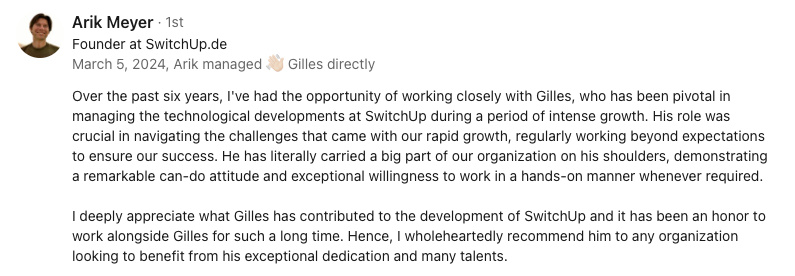Modern C++ Mastery: A CTO's Guide to Performance and Leadership
Abstract:
As a Chief Technology Officer (CTO), embracing Modern C++ (C++17 and C++20) is crucial due to its enhanced support for concurrency, improved type inference, and metaprogramming capabilities. Memory management, including techniques like smart pointers and memory pooling, is emphasized for performance optimization. Multithreading is essential for building scalable systems, with C++17's std::thread and C++20's better integration of parallel algorithms in the Standard Template Library (STL) playing key roles. The CTO stresses the importance of balancing management and technical expertise, encouraging continuous learning and collaboration among engineering roles to stay ahead in technology and engineering innovation.
introduction and importance of modern C++ for CTOs
Why should we, as Chief Technology Officers, care about the evolving landscape of C++? Well, it's simple: staying up-to-date with Modern C++ is crucial for driving performance and fostering innovation within our tech teams. C++17 and C++20 bring a treasure trove of new features that can significantly enhance the efficiency and scalability of our projects. Our role as CTOs isn't just about steering the ship but also ensuring our engineers are availing of the latest technological advancements.
The advancements in Modern C++ offer us robust tools for improved concurrency, powerful type inference, and sophisticated memory management techniques. These features aren't just bells and whistles; they are game-changers that can drastically reduce runtime and resource consumption. When our teams integrate these capabilities into their development processes, we're not just improving code quality—we're cultivating an environment where innovation can truly thrive.
Moreover, leveraging these standards isn't just about writing better code. It's about setting an example, driving enthusiasm for new technical challenges, and staying ahead of the curve. The modern tech landscape waits for no one, and our ability to adopt and champion these new standards can set us apart from the competition. So, let's dive into how these features can translate into tangible benefits for our projects and our teams.
enhanced concurrency support in modern C++
Concurrency is like the secret ingredient in the magic potion of performance optimization, especially for large-scale applications. In the latest iterations of C++, namely C++17 and C++20, concurrency support has received a massive boost, making our lives as CTOs significantly easier when it comes to building scalable and efficient systems.
Let's start with std::thread, the workhorse of concurrency in C++. This feature allows our teams to spawn multiple threads effortlessly, distributing tasks across processors for better performance. std::thread is not just user-friendly but also highly efficient, enabling parallel execution of code that can drastically cut down processing time. Imagine your most complex algorithm crunching data in half the time; it's like watching a snail turn into a gazelle!
Next up, the advanced parallel algorithms introduced in C++17 and upgraded in C++20. These algorithms, such as std::for_each, std::sort, and others, can now run in parallel, thanks to the std::execution policies. Just like a well-coordinated relay race, these parallel algorithms hand off tasks seamlessly, minimizing latency and maximizing throughput. This is a game-changer for tasks like sorting extensive datasets or processing large arrays, where every millisecond counts.
What's more, the new std::async functionality allows for asynchronous function calls, providing a straightforward way to achieve concurrency with futures and promises. Think of it as a way to ask your code to "get on with something else" while waiting for a specific task to complete. It's like multitasking at its finest, ensuring that your processors never idle.
Adopting these features is like giving our engineers a jetpack for their development process. We're not just writing faster code, but we're also creating a work environment that values performance and efficiency. As CTOs, encouraging the use of these modern concurrency tools can lead to projects that are not just successful but exceptional. Plus, who doesn't want to be known as the tech leader who brought in the cool, multi-threaded wonders?
advanced type inference and metaprogramming in C++17 and C++20
Modern C++ has dramatically improved how we handle types and metaprogramming, making our lives a lot easier and our code a lot cleaner. The advancements in type inference and metaprogramming introduced in C++17 and C++20 bring just the right mix of power and elegance to our development toolkit. These features streamline code development, reduce errors, and significantly boost productivity.
First, let's talk about type inference. We all love auto, right? Introduced in C++11 and further enhanced in the latest standards, auto helps in automatically deducing the type of a variable from its initializer. It's like having a super-intelligent assistant that knows exactly what you mean. C++17 brought us std::optional and std::variant, which combined with auto, make our code more readable and less error-prone. Who knew we could reduce so much boilerplate code without losing clarity?
Diving into the metaprogramming aspect, C++20 introduced concepts and ranges, game-changers for template programming. Concepts allow us to specify constraints on template parameters in a much more readable way, making templates feel less like obscure spells and more like readable contracts. This newfound clarity in our code ensures that the compiler catches errors earlier, saving us from those dreaded late-night debugging sessions.
Ranges, on the other hand, offer a more expressive and functional approach to sequence processing. By allowing lazy evaluation and composition of operations, they can significantly optimize performance and tidy up those messy loops. It's like having a Swiss Army knife for handling collections, ready for any challenge without the clutter.
A practical application of these features could be seen in situations where we handle large datasets. For instance, by using ranges, we can chain operations like filtering, transforming, and reducing in a concise manner, all while maintaining performance. Combined with robust type inference and metaprogramming techniques, we craft solutions that are not only efficient but also maintainable.
By embracing these advancements, we set our teams up for success. When our engineers work with tools that simplify complex tasks, they have more time and mental energy to focus on innovation. As CTOs, it's our responsibility to advocate for such modern practices, ensuring that we don't just keep up with the times but also, as always, aim to stay ahead of the curve. So let's make type inference and metaprogramming our best friends and revolutionize the way we write C++ code.
memory management techniques for performance optimization
Effective memory management is a critical aspect of developing scalable and high-performing applications in C++. As a Chief Technology Officer, I often emphasize the importance of mastering memory management techniques to our engineering team. After all, handling memory efficiently isn't just beneficial—it's essential for application responsiveness and resource optimization.
One of the most pivotal advancements in Modern C++ is the introduction of smart pointers. These are essentially intelligent pointers that automate memory management, drastically reducing the risk of memory leaks. Smart pointers like std::unique_ptr, std::shared_ptr, and std::weak_ptr enable automatic deallocation of memory when objects are no longer in use, turning memory leaks into a thing of the past. Using a smart pointer is like having a diligent housekeeper for your application, ensuring everything is tidy and in order.
Let's break down these smart pointers:
-
std::unique_ptr: For exclusive ownership, ensuring that only one pointer can own a resource at a time. -
std::shared_ptr: Allows multiple pointers to share ownership of a resource, using reference counting to manage memory. -
std::weak_ptr: Provides a non-owning reference to an object managed bystd::shared_ptr, helping to break cyclic references that would otherwise cause memory leaks.
Another technique that deserves the spotlight is memory pooling. Memory pooling preallocates a block of memory and then allocates parts of it on demand. This approach minimizes the overhead associated with frequent memory allocation and deallocation, which can be a significant performance bottleneck in high-demand applications. By reusing memory blocks, we not only enhance performance but also improve memory locality, aiding cache performance.
Memory pooling is especially useful in scenarios requiring numerous small allocations and deallocations—think game development or real-time data processing. It's akin to having a dedicated parking lot where your program can quickly find a spot, instead of driving around the block repeatedly.
Combining smart pointers with memory pooling creates a robust strategy for memory management. While smart pointers ensure automatic, error-free memory deallocation, memory pooling provides a performance boost by reducing allocation overhead. These techniques together create a harmonious balance that can significantly enhance an application's responsiveness and resource efficiency.
By prioritizing these memory management techniques, we empower our tech teams to build smoother, faster, and more reliable applications. Plus, there's something immensely satisfying about knowing we've got a grip on our memory usage, which keeps our systems running like well-oiled machines. So, let's embrace these powerful tools and elevate the performance game to the next level!
multithreading and scalability in modern C++
Multithreading is like the golden ticket to building scalable systems and, in Modern C++, the tools at our disposal have never been better. In C++17, std::thread became our go-to function for spawning threads, effortlessly spreading tasks across multiple processors. It's like having a dedicated team of minions, each efficiently completing a piece of the puzzle, making entire processes run smoother and faster.
With the advent of C++20, the integration of parallel algorithms in the Standard Template Library (STL) took things a notch higher. These algorithms are designed to work with multiple threads and processors, offering functions that can execute in parallel. Functions like std::for_each, std::reduce, and std::transform_reduce now have additional std::execution policies that allow them to operate concurrently with ease.
Imagine running a massive data sort operation. With parallel algorithms, sorting large datasets becomes significantly more efficient. By simply adding an execution policy like std::execution::par, the problem instantly gets divided into smaller parts, processed concurrently, and then pieced back together. This results in a substantial speedup without complicated thread management—it's practically magic!
The beauty of these enhancements is that they abstract away the complexity of thread management, letting our engineers focus on the logic rather than the plumbing. However, it doesn't stop at just improving code performance. By incorporating multithreading and parallel algorithms, we create a codebase that can scale easily with the hardware. As more processors or cores become available, the existing code can leverage them without significant rewrites—a dream scenario for any tech team.
Beyond the technical perks, fostering an environment that values multithreading and scalability signals to our team that we’re serious about performance. It encourages them to think about how they can write code that not only works but excels under pressure. It’s like upgrading our team from a single-speed bike to a high-performance racing bicycle—same effort, but oh, so much faster!
So, let’s make multithreading the heartbeat of our scalable systems. By leveraging features from C++17 and C++20, we’re not just keeping up with modern practices; we’re setting the stage for high-performance applications that stand the test of time.
balancing technical expertise and leadership
As CTOs, we're expected to wear two hats: one brimming with technical acumen and the other with leadership prowess. Now, balancing these two isn't always a walk in the park. Having a deep understanding of Modern C++ is essential, but coupling that technical know-how with effective leadership is what truly sets us apart.
Maintaining a grasp on the latest in Modern C++, such as the enhancements in C++17 and C++20, allows us to make informed and strategic decisions. Think about it—how can we push for the integration of advanced concurrency tools or improved memory management techniques if we don't fully understand their potential? Our technical chops enable us to separate the substance from the sizzle, ensuring that our tech teams are leveraging the most impactful features.
However, technical expertise alone doesn't translate into effective leadership. We must cultivate a culture where continuous learning and innovation are not just encouraged but celebrated. This involves fostering an environment where engineers feel comfortable experimenting with new features and approaches, knowing they have our support. Regular knowledge-sharing sessions, code reviews focused on Modern C++ techniques, and encouraging participation in tech conferences can work wonders. The goal is to keep the excitement for learning alive and kicking.
Striking the right balance also means knowing when to step back and let our engineers shine. While it's tempting to dive into the code ourselves, empowering our teams is far more effective. Providing guidance, setting clear goals, and offering constructive feedback are all part of nurturing a high-performing team. Remember, leadership isn't about holding on to the steering wheel all the time; it's about ensuring the car is headed in the right direction and trusting the drivers (our engineers) to keep it on course.
Another critical aspect is communication. As interpreters of complex technical concepts, we need to translate these into strategic visions that align with business goals. Whether it's presenting to the board or explaining to a stakeholder why we're adopting a new concurrency model, clear and effective communication is key.
Ultimately, as CTOs, our role is to blend our technical expertise with leadership skills seamlessly. By staying on top of Modern C++ advancements and cultivating a culture of continuous learning, we not only build superior products but also inspire our teams to reach new heights. And hey, if along the way we occasionally get to geek out about the latest C++ feature with our engineers, that's just a bonus!
encouraging continuous learning and collaboration
Creating an environment that thrives on continuous learning and collaboration is one of my primary goals. As a CTO, I recognize that keeping our team up-to-date with the latest technology trends and fostering a collaborative spirit are key to maintaining our competitive edge and driving innovation.
Firstly, I emphasize the importance of staying current with emerging technologies. Regular workshops and tech talks are integral to our culture. Scheduled knowledge-sharing sessions where engineers can present recent learnings, either from conferences or new projects, ensure that everyone stays informed and inspired.
Encouraging team members to attend external conferences and courses is another strategy that pays dividends. It’s not just about absorbing new information but also networking with peers and experts. The insights and connections gained from such experiences often spark fresh ideas and approaches when they return to our team.
Another important aspect is fostering a collaborative environment. To achieve this, I promote open communication and regular code reviews. This practice not only improves code quality but also facilitates learning from peers. Our engineers often uncover new techniques and optimizations that they can apply to their projects.
Customized mentorship programs also have a significant impact. By pairing experienced engineers with newer team members, we accelerate the learning curve while also strengthening team bonds. It's a win-win scenario that benefits individuals and the organization alike.
Finally, I ensure that our collaborative tools are top-notch. Platforms that facilitate real-time collaboration, version control, and code integration are non-negotiable. Think of it as building a robust digital playground where creativity and productivity flourish side by side.
Through these strategies, we not only keep our technical skills sharp but also create a nurturing environment where innovation can thrive. And if we happen to enjoy a bit of healthy geekiness along the way, that’s just the icing on the cake!
conclusion and call to action
We’ve covered a lot of ground about the power and potential of Modern C++. From enhancing concurrency, type inference, and metaprogramming, to mastering memory management and multithreading for scalability—each topic underscored how critical staying updated with the latest C++ standards is for us as CTOs. These advancements aren't just nice-to-haves; they are pivotal in driving performance, efficiency, and innovation within our teams.
Our technical expertise enables us to make informed decisions, but it's our leadership that ensures those decisions translate into tangible improvements. Balancing both is the key to not just surviving but thriving in our roles. Imagine the impact of adopting cutting-edge concurrency tools or advanced memory management techniques; it can be the difference between a good product and a great one. And let's face it, who doesn't want to steer projects that make a mark?
I encourage my fellow tech leaders to champion continuous learning and foster a culture of innovation. By conducting regular workshops, encouraging attendance at conferences, and promoting open communication through code reviews and mentorship programs, we create an environment where curiosity and collaboration flourish. Not only do these practices keep our technical skills sharp, but they also build a strong, cohesive team ready to tackle any challenge.
In this fast-paced tech world, resting on our laurels is not an option. We need to stay proactive, continually exploring the latest standards, and integrating them into our strategies. Our role as CTOs is not just to oversee but to inspire, lead, and sometimes geek out with our teams about the newest C++ feature. By doing so, we pave the way for groundbreaking innovations and set a stellar example of what it means to be forward-thinking leaders.
So, let's continue to push boundaries and elevate our standards. Mastering Modern C++ is not just about improving code—it's about fostering a culture of excellence, innovation, and relentless improvement. And remember, a touch of humor and a sprinkle of enthusiasm can make this journey even more rewarding. Let's lead by example and make outstanding performance the norm!














